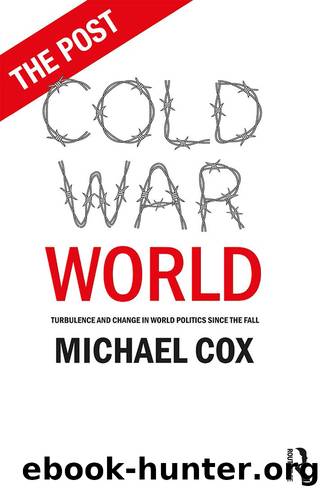The Post Cold War World by Michael Cox

Author:Michael Cox [Cox, Michael]
Language: eng
Format: epub
Tags: History, General, Asia, China, Military, Persian Gulf War (1991), Iraq War (2003-2011), Russia & the Former Soviet Union, United States, 20th Century, World, Modern, 21st Century
ISBN: 9781351140942
Google: AXx_DwAAQBAJ
Publisher: Routledge
Published: 2018-12-14T02:59:15+00:00
Après l'empire, le déluge
âGeorge Bush did almost everything diplomatically possible to keep the Soviet Union alive.â42
The withdrawal of Soviet power from Europe and German unification could not but have consequences back in the USSR.43 Indeed, one of the many charges laid against Gorbachev by his critics then, and much later, was that he had in effect betrayed the Soviet people by simply abandoning everything the USSR had sacrificed so much for in its great war of liberation against the Nazi enemy between 1941 and 1945. Some were even so suspicious of the Americans and NATO that they even began to wonder aloud about Gorbachevâs loyalty to the USSR itself. But as one of his key aides noted at the time, what was really undermining Gorbachev was less the loss of the USSRâs âcordon sanitaireâ to the West â though this hardly helped his cause â and more the economic and political situation at home.44 By late 1990 the position had become critical; and a few months on into the spring of 1991, it had become nearly impossible. As the situation continued to deteriorate, it gradually began to dawn on policymakers in the West that the Union itself might not hold together.45
The possibility that the USSR might in fact break up was one that caused significant consternation, not to mention intense debate, within the western intelligence community. Two positions began to take shape. One held that there was nothing in the end that could be done to prevent the USSR from falling apart, and that there might even be significant strategic benefits for the West and the US if it were to do so. But there was another equally, if not more influential, viewpoint. This maintained that not only would the USSR hold together, it also assumed that its disintegration was not necessarily in anybodyâs interest, including that of the United States.46 Indeed, the consequences of this particular empire falling apart could be potentially catastrophic, for not only would it unleash all sorts of possible dangers ranging from nuclear proliferation to outbreaks of irredentist wars, it would also make economic reform that much more difficult.
These fears were heightened in the minds of many western policymakers by the tragedy then beginning to unfold in Yugoslavia. Here, the end of the Cold War announced itself not as liberation but as ethnic cleansing and bloody war. Many then drew the not unreasonable conclusion that if this could happen to a small, non-nuclear state which had been relatively tolerant and open for many years, what kind of Pandoraâs Box would be opened up if the USSR â which had rarely been open, never been especially tolerant and did possess nuclear weapons â went the same way? Gorbachev used precisely this argument with Bush, Scowcroft and Robert Gates at a private meeting held in Russia in July 1991. What was happening in former Yugoslavia he warned could very easily happen in the USSR, but with two very important differences. It would be on a much greater
Download
This site does not store any files on its server. We only index and link to content provided by other sites. Please contact the content providers to delete copyright contents if any and email us, we'll remove relevant links or contents immediately.
| Civil War | Operation Desert Storm |
| Veterans | Vietnam War |
The Radium Girls by Kate Moore(10915)
The Templars by Dan Jones(4193)
100 Deadly Skills by Clint Emerson(4085)
Rise and Kill First by Ronen Bergman(4020)
The Doomsday Machine by Daniel Ellsberg(3737)
The Rape of Nanking by Iris Chang(3526)
Killing England by Bill O'Reilly(3461)
Hitler in Los Angeles by Steven J. Ross(3447)
Stalin by Stephen Kotkin(3091)
12 Strong by Doug Stanton(3060)
Hitler's Monsters by Eric Kurlander(2737)
Darkest Hour by Anthony McCarten(2650)
Blood and Sand by Alex Von Tunzelmann(2611)
The Art of War Visualized by Jessica Hagy(2416)
Hitler's Flying Saucers: A Guide to German Flying Discs of the Second World War by Stevens Henry(2301)
The Code Book by Simon Singh(2217)
The Second World Wars by Victor Davis Hanson(2136)
Babylon's Ark by Lawrence Anthony(2073)
Tobruk by Peter Fitzsimons(2065)
